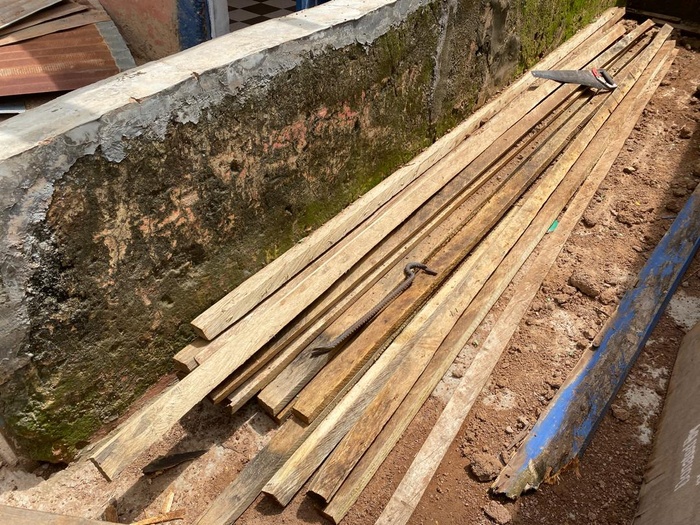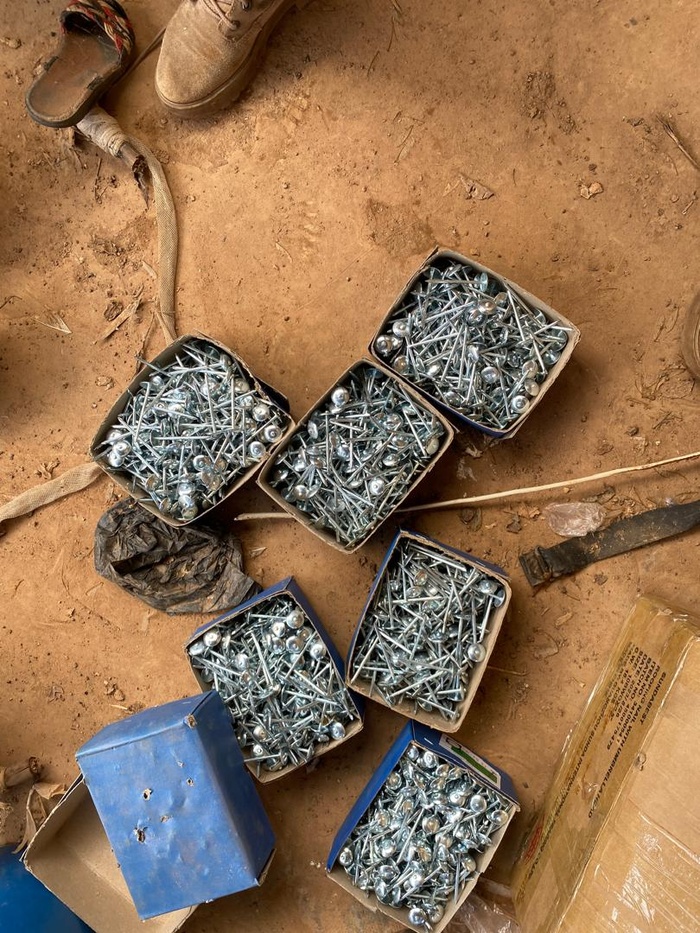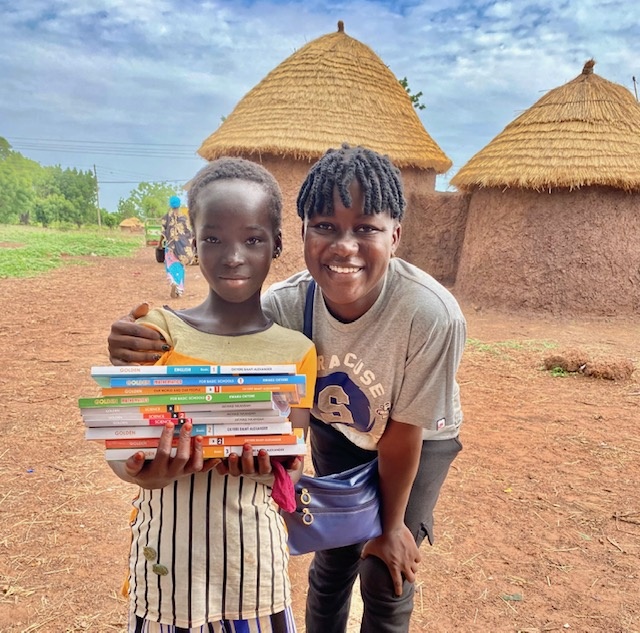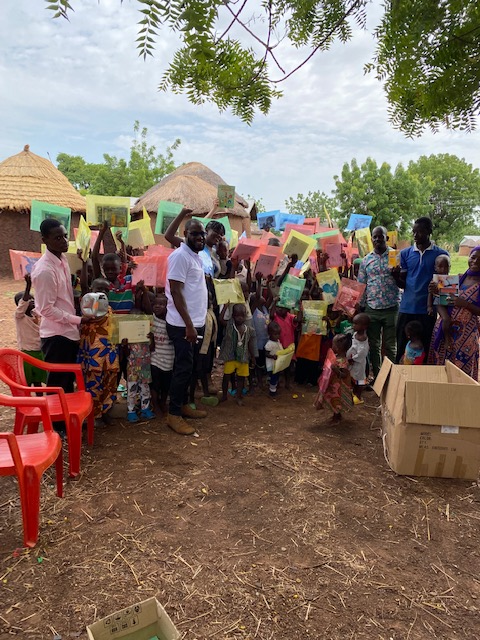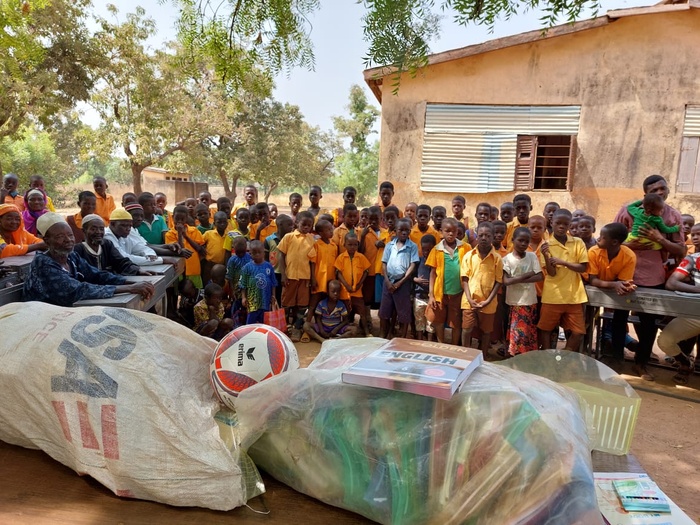We're glad to share the work of a new collaborator at Pond Foundation - the Anyim Wa project organized by Denis Opio! The Anyim Wa Community Initiative (AWCI) is dedicated to transforming the lives of women and youth in Northern Uganda by addressing poverty, inequality, and environmental challenges through innovative programs rooted in empowerment, mentorship, and sustainability.
Their main activities include:
1. Livelihood and Enterprise Development: AWCI trains women and youth in hands-on income-generating skills such as tailoring, soap-making, and regenerative agriculture, while also equipping them with entrepreneurial knowledge to start and grow sustainable businesses.
2. Transformative Leadership and Mentorship: AWCI fosters leadership skills, critical thinking, and personal growth through coaching and mentorship programs, empowering participants to become confident change-makers in their communities.
3. Climate Coaching and Advocacy: AWCI integrates climate resilience training into its programs, inspiring women and youth to lead local environmental conservation efforts and promote sustainable solutions at the grassroots level.
Anyim Wa will be joining us as a Hilary's Kids partner in an effort to more effectively raise funds for the project moving forward! Please reach out to us or to Denis should this resonate with you.
We're glad to share the work of a new collaborator at Pond Foundation - the Anyim Wa project organized by Denis Opio! The Anyim Wa Community Initiative (AWCI) is dedicated to transforming the lives of women and youth in Northern Uganda by addressing poverty, inequality, and environmental challenges through innovative programs rooted in empowerment, mentorship, and sustainability.
Their main activities include:
1. Livelihood and Enterprise Development: AWCI trains women and youth in hands-on income-generating skills such as tailoring, soap-making, and regenerative agriculture, while also equipping them with entrepreneurial knowledge to start and grow sustainable businesses.
2. Transformative Leadership and Mentorship: AWCI fosters leadership skills, critical thinking, and personal growth through coaching and mentorship programs, empowering participants to become confident change-makers in their communities.
3. Climate Coaching and Advocacy: AWCI integrates climate resilience training into its programs, inspiring women and youth to lead local environmental conservation efforts and promote sustainable solutions at the grassroots level.
Anyim Wa will be joining us as a Hilary's Kids partner in an effort to more effectively raise funds for the project moving forward! Please reach out to us or to Denis should this resonate with you.
On July 9th, 2024, roofing materials were donated for the renovation of the teachers' apartment in the Buaduyili community of Bimbila district, Ghana. This donation aimed to provide improved living conditions for teachers, enhancing their well-being and reinforcing the community's commitment to educational progress.
The teachers' apartment, originally constructed around ten years ago by community members, has suffered significant wear and tear due to prolonged exposure to harsh weather conditions. The deteriorating roof has caused leaks, compromising the safety and comfort of the residing teachers. Unfortunately, the community cannot afford the necessary roofing repairs, and with the current rainy season starting in the northern region of Ghana, the leaking roofs prevent teachers from staying in the community. This means the teachers must stay in other areas nearby, but poor road conditions makes traveling to teach ineffective and more costly.
In response to the community's call for support, the Pond Foundation donated high-quality roofing materials, including aluminum zinc sheeting, various types of nails, and wood. The total cost of purchasing materials, roofing, labor, and other expenses amounted to approximately $550.
The donation of roofing materials is expected to bring significant benefits to the Buaduyili community including:
- Enhanced Living Conditions: Eliminating leaks will create a more comfortable and secure living space for teachers.
- Teacher Retention and Attraction: Improved living conditions will help retain current teachers and attract new ones, addressing a key challenge faced by rural communities.
- Increased School Attendance: The renovation project is anticipated to lead to more children attending school, as teachers will be available and motivated to teach.
The community expresses profound gratitude to Pond Foundation and their generous donors. This donation not only addresses a critical infrastructural need but also symbolizes a commitment to the betterment of education in the Buaduyili community.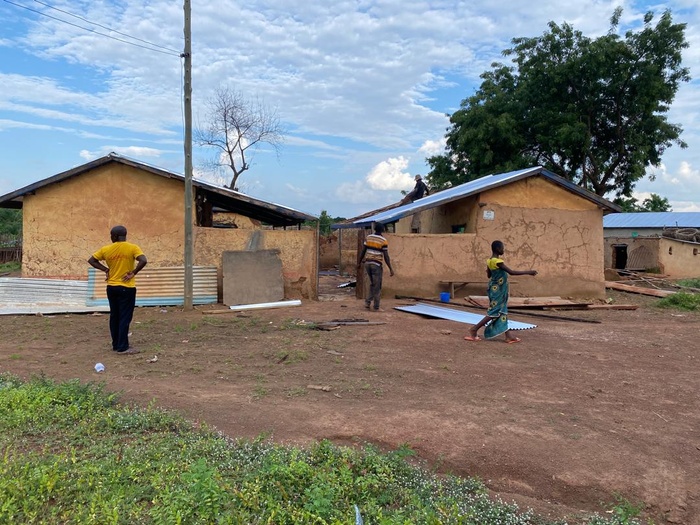
The Wantugu community in Tolon District, Northern Ghana, has been facing ongoing healthcare challenges. This health facility serves five neighboring communities but struggles with numerous issues. On June 15th, 2024, a significant donation of medical supplies was made to address these challenges.
Before the donation, a needs assessment was conducted through informal interviews with health workers and community members to identify the facility's requirements. The identified needs included a wide range of essential medical supplies, such as:
- Delivery bed
- Baby weighing scale
- Oxytocin
- Gloves
- Postnatal drugs (ibuprofen, amoxicillin, and metronidazole)
- Bleach for cleaning the facility
- Liquid soap
- Forceps and scissors
- Nose masks
- Cord clamps
- Infusions
- BP apparatus
- Sterilizers
- Thermometer
- Baby cot
Wantugu Community
These and many other items are basic necessities for a community health facility to run smoothly. Unfortunately, most communities in Northern Ghana, including Wantugu, cannot afford them. Although we would have loved to provide everything on the list, financial constraints made it impossible but thanks to the generosity of our donors, the following supplies, valued at approximately $500, were provided: - Baby weighing scale
- Gloves
- Ibuprofen
- Amoxicillin
- Bleach for cleaning the facility
- Liquid soap
- Nose masks
- Cord clamps
- Infusions
The donation profoundly impacted the Wantugu community and its neighboring areas by:
- Enhancing the healthcare facility's capacity to provide quality care.
- Alleviating the financial burden on low-income families struggling to afford basic antibiotics and pain relievers.
- Empowering healthcare workers with the protective tools (nose masks and gloves) they need to perform their duties safely.
One midwife of the facility expressed her gratitude, stating, "This generous donation has significantly boosted our ability to serve the community. We previously used makeshift solutions for cord clamps; now we can do the right thing."
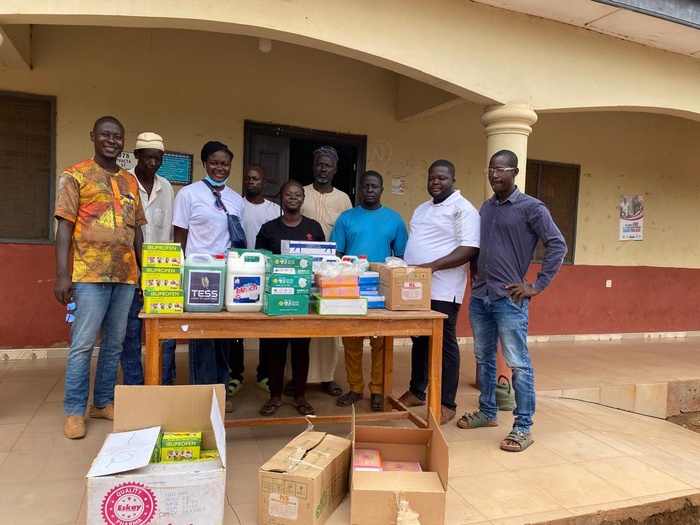
A community member, Mma Memunatu, shared her relief, saying, "As a small farmer and mother, affording medical supplies has always been a challenge. This donation means so much to my family and me. It’s a blessing."
The donation of medical supplies to the Wantugu community is a crucial step in enhancing local healthcare and supporting vulnerable people, especially women and children. By equipping the health facility with the necessary tools to tackle common health conditions like malaria, typhoid, and cholera, we hope to improve maternal healthcare in these communities.
Once again, We would like to extend our heartfelt gratitude to our donors for their generosity and support. It's through their collaboration that initiatives like Hilary’s Kids become possible, amplifying our impact and creating lasting change.
We're thrilled to share the impact of our recent Hilary’s Kids donation, which took place earlier this month. Essential educational materials were distributed within four rural communities in northern Ghana, namely; Sung, Bagurugu (Karaga district), and Apeleyili, Kapalinayili (Tolon district).
The donation supplied key resources to improve learning opportunities and support the educational development of the children in these communities. Donated items included:
- Textbooks
- Exercise books
- Stationery (pens, pencils, color pencils sharpeners, erasers)
- Copy books
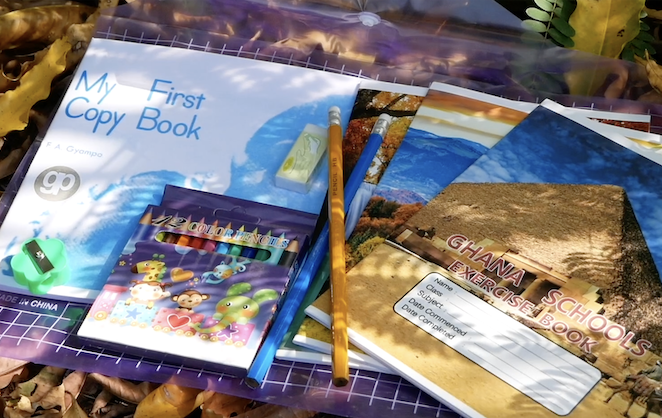
In total, 479 children between 6 to 12 years of age benefited from these donations, with 284 boys and 195 girls among the recipients. This statistic is an indication of important challenges faced in Northern Ghana; boys often have a higher chance of attending school compared to girls as many parents struggle to afford schooling costs and, when they can, prioritize sending boys while girls remain at home to tend to household chores.
We're committed to changing this narrative. By providing learning materials directly to these communities, we're empowering both boys and girls to pursue their education and unlock their full potential. Now, students in Sung, Bagurugu, Apeleyili, and Kapalinayili have access to essential resources that were previously lacking, enriching their educational experience and opening doors to academic success.
Looking forward, we remain dedicated to monitoring the impact of our donations and exploring further opportunities to support these communities. Together with our donors, we're making a tangible difference in the lives of children in rural Ghana.
We would like to extend our heartfelt gratitude to our donors for their generosity and support. It's through their collaboration that initiatives like Hilary’s Kids become possible, amplifying our impact and creating lasting change.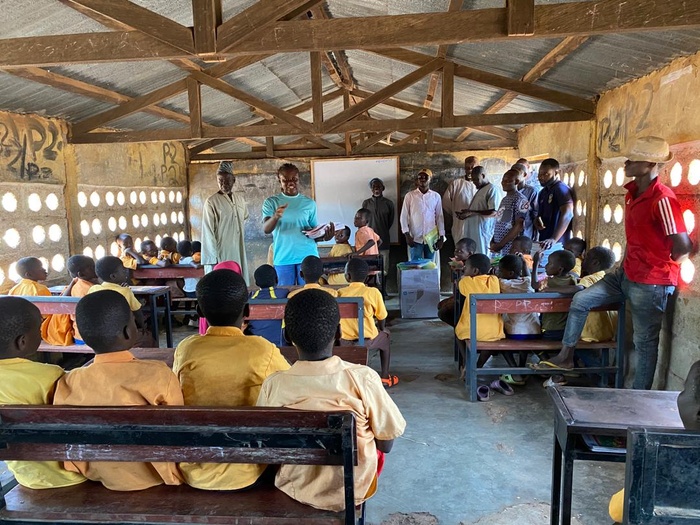
Thanks to the unwavering support of our donors and the dedication of our team, The construction of a two-block toilet facility has been realised in the rural community of Nakpatua, Northern Ghana.
Until recently, the 1000+ residents of Nakpatua faced significant challenges regarding sanitation. With no contained toilet facilities available, open defecation was distressingly common, posing serious health risks and compromising the dignity of community members, particularly women and children.
The impact of this project extends beyond the confines of Nakpatua. By addressing a fundamental aspect of human dignity – access to clean and safe sanitation – The foundations for healthier and more resilient communities across the region are being realised. Improved sanitation not only reduces the prevalence of waterborne diseases but also fosters economic development by enhancing productivity and reducing healthcare costs.
As we celebrate this development for Nakpatua, we extend our gratitude to our donors whose generosity has made this endeavour possible. Your support has transformed lives and brought hope to an underserved community. Together, we are making a tangible difference in the world, one toilet at a time.
Moving forward, we remain committed to our mission of promoting sustainable development and improving the well-being of communities in need. With your continued support, we are confident that we can build a future where every individual has access to the basic necessities of life – including the dignity of a safe and hygienic toilet facility.
*photo of new toilet facility
Hi Everyone,
I am ashamed. It's been way too long since I posted an update here - the last one was back in May. That you continue to send your monthly donations in the absence of any news just tells me how fantastic you are and that you trust me. I don't take that trust for granted and must simply apologise for being so flat out on the Bambara bean project with the communities (I'm here in Tamale now), that I've just not been able to sit down for a moment to share with you where we're at.
Elizabeth, our champion Hilary's Kids initiative coordinator here in northern Ghana did send me through an update about a month ago, but I wanted to add to it and, well...here we are. I just couldn't get to it.
Anyhow, enough apologising and let's get you updated.
We're in a good place as far as the communities are concerned. The Bambara project has engaged with 7,260 farmers in 56 communities. Last year, we engaged with 980 farmers in 25 communities, so this is a big leap. Last year, we grew 60 metric tons (MT) of beans, this year, we expect to buy 2,500 MT! Last year, of the farmers we partnered with, 600 were women; this year, it's almost 3,500. This is hugely important because women here in the Muslim north don't get access to land - the men own it, which is why so many young women migrate south to Accra in search of work. Young men go too, because there simply isn't any money in farming. When they get there, they're looked down on as being from "the north"; they're exploited and often sexually abused. Many return home, broken, with babies and STDs, including HIV. It's a terrible thing. So many of the communities have told us that we're creating hope here that their children will not have to take that journey. Fingers crossed.
We've learned from research in published papers that the average annual household income in the north among the farming communities is GHC2,375 which, would you believe, is only around $200/year. What's even more extraordinary, is that the average household comprises 10 people. That's $200 per year to provide for 10 people! It just makes me silent when I think of it and confirms what we see with our own eyes - the people here are desperately poor.
What's exciting is that with their Bambara farming, assuming the farmer gets an average yield on the 1 acre they plant of 400kg, they'll generate an income of around GHC3,000. That's on top of their GHC2,375 ($200) average income from their other crops. That means, we're more than doubling their household income and, because the women are planting too, many households have 2 acres planted - one by the father, one by the mother - which should net them, with an average yield, GHC6,000. And...we expect many farmers to get a lot more than the average yield because the rains have been good this year and the farmers have done a great job weeding their fields. We're lifting people out of poverty.
On the Hilary's Kids side of things, we continue our work to improve the people's lives. Since our last update, we've donated more education materials and have supported one community to build a school. We've been asked by a community to support them with toilets and Elizabeth has worked with a local NGO to make a plan for that and in the coming month, we'll have that project up and running.
We must make a special mention of the leaders at WhatIF Foods, the company that is supporting the Bambara project here. Back in May, they tested a new packer for their milk in Melbourne, Australia. As part of the requirement for such a test, they need to produce and pack 10,000 litres. Typically, this would be then be thrown away. With an eye to the children's nutritional challenges here, where almost 40% of children in the northern regions aged 0-5 years old are stunted and suffering malnutrition because during the long dry season where their diet consists of 98% carbohydrates, WhatIF shouldered the very significant expense of shipping the milk here to Ghana. The company then paid the import duty - which is a LOT of money - and some of the senior leaders, out of their own pocket, paid the port clearance and transport costs to bring the milk here to Tamale. They did not have to do that. It could have all been poured down the drain in Melbourne.
I think that's quite extraordinary and deserves a special moment of silence. Big thanks to WhatIF Foods for making that happen.
The milk arrived in August and we will distribute it in the comings weeks among all the 56 communities as we go out to buy the beans.
On the WaterSafe filters project, we have funds now to build 5 new WaterSafe filters. We learned during the rainy season that the farmers harvest rainwater from the tin roofs in their communities so there wasn't a demand for new WaterSafe filters. We tried to convince some of the communities we know will benefit from a filter to work with us during the rains to set up a filter so that come the long dry, they'll already be in good shape, but they didn't need water at the time, so they couldn't get into it. They very much think in the moment here. To be fair, they were also very busy in their fields. Over the coming months, we'll get those WaterSafe filters deployed.
We've got funds now to buy more education materials and to scale up other health, education and sanitation infrastructure activities.
Lastly, one of our Pond Foundation members, Tzippora Nusbaum from "Fix the Chain," has sponsored a project and bought technical assistance for a Mushroom growing pilot. Working with about 60 women in two of our partner communities, Elizabeth is getting guidance from Tzippora and a local mushroom expert, and the first crops have been harvested. The women had never grown or eaten mushrooms before and they love them very much. They believe them to be really good for them, especially their children, so they're very happy. Elizabeth is selling some dried mushrooms to restaurants and some supermarkets here in Tamale, and last week, took the first money back to the women. There was great happiness! Our colleague Kyle Houston has made a video about the mushroom project for Tzippora and we'll share that with you when it goes live.
Kyle is also making a general 5-minute video to talk all about Hilary's Kids and everything we're doing here. We hope that it will help us raise more funds. We'll share that with you soon so that you can see what your donations are creating here and perhaps, to share with others to inspire them to donate too.
And really lastly, a special mention for my counterpart here, Mashud Fuseini, CEO and Founder of Kasima Ghana. Mashud leads the Bambara Outreach Program here and is a constant support for everything Hilary's Kids as are his team. We're lucky to have someone like Mashud and his team to help us. He and his colleagues truly want to see the best for the communities.
OK! So that's something of an update. I promise to not be such a stranger going forward. I'll share pictures of the milk distribution soon and the videos too.
If you have any questions about anything I've shared here, please send them through.
Once again, a million thanks for your continued support for everything we're doing here to help the people to live much better lives.
As we join hands towards providing educational and health needs for children in rural communities, we are leading the transition away from children growing to become young parents, unemployed, or low income, towards the right to learn, becoming future decision makers and role models for other children.
We at Hilary’s kids aim to stop anything that is threatening children’s education and health and ensuring they’re in school and learning. Poverty has turned the lives of children upside down, denying them access to education and health but we are hoping to make a change.
It will interest you to know our partner community-base has increased from 25 communities to 56 communities. This is an additional responsibility, sounds like more work to do, and requires more resources, but then let’s take it back to what has been happening after our last update.
Nakpatua is one of our partner communities that is very vibrant. They understand the importance of education but they lack the resources to give their children the quality education they deserve. These community members decided to do communal labor to put up a two classroom building. We supported with roofing materials and cement, and could have done even more with more resources. This intervention brought so much joy to the children and parents because this will help them move from a one classroom to a two classroom building. In a normal case, a community should have at least six classrooms for a start but we are taking it one step at a time.
Aside from this community, we made donations of learning materials to two other communities with a total number of 146 children, one out of which doesn’t have a school. The children walk about 5 kilometres every day to the next community to have access to education, so these learning materials were of great impact to them. I wish you were present to see the smiles on the faces of these children, lots of prayers from parents. I’ll be attaching some pictures.
All this was possible due to the donations you sent in, on behalf of the children and parents we want to say thank you for your generosity.
Currently we have 41 partner communities out of our 56 that have yet to receive any support. We have a lot of children in these communities who’s parents don’t even understand the importance of education, some of these children desire to go to school, but provisions are not made for them. We are looking forward to your ongoing support to bring change to these communities.
The people in our partner communities are gearing up for the planting season as the rains arrive. Over the coming months, we’ll be doing more to offer learning kits and other support wherever we can. I look forward to keeping you updated as our program rolls forward to change the life of every child we can.
Best wishes
Bashiru Elizabeth
Hilary’s kids
Ghana.
Hello everyone,
I am glad to bring you updates from Hilary’s kids. For the past week, I have been visiting our 25 communities in northern Ghana. This visit was to assess the impact of Hilary’s kids’ donations made in some 11 communities last year and also to conduct needs assessment interviews to identify the educational and health needs of these children.
Through this visit, I identified the following; 6 out of 25 communities visited don’t have schools or health facilities, picture this: A community without education and many more communities in northern Ghana don’t have access to education.
Also, some communities have just one or two classrooms they use for teaching and learning and exacerbated by the lack of basic teaching and learning materials such as textbooks, pencils, school bags, sandals and so on. Children sit on the floor to learn because the school luck furniture and the children don’t have access to school uniforms because the government has not provided them and parents can’t also afford them.
To mention, I visited these CHPS compounds (health facilities) and they did not have the medication and equipment necessary for childbirth. Presently, it is impossible to get proper basic healthcare in these facilities but with your help, we are hoping to make the impossible possible.
Currently, I am working on a budget to donate learning kits and maternity equipment alongside some first aid to some communities and hopefully share some pictures with you.
I appreciate your support,
Bashiru Elizabeth,
Lead for Hilary’s kids.
Ghana.
Education, they say, is the surest path to a brighter future and anytime you invest in a child's education, you are building a bright future for that child. And for us at Hilary's Kids, this is where we drive our satisfaction.
When you make a donation to the Hilary's Kids project, rest assured it will go a long way in improving children's "educational, nutritional and medical needs" and many more.
We are thrilled to bring to your notice that 2022 was amazing. With your help, we successfully made donations to a total number of 11 communities (out of 25 communities) a sum of 900plus children in our 5 DISTRICTS in northern Ghana. See the attached pictures of children with so much excitement on their faces and that of parents who are grateful that their children have the opportunity to go to school and have access to learning materials .
We also renovated a part of a school block to create a decent space for teaching and learning. The donation also came as a relief to many families who previously could not provide these essential materials to keep their wards in school. Again, in partnership with the Ghana health service, we provided some health service equipment to a health facility, this was to help improve access to primary healthcare in the community, currently, this is greatly improving maternal health care, childbirth, and enhancing child health and general primary healthcare delivery in this community.
Thanks to your generous donations, these activities were possible. There is more to be done over here, let us continue to donate in order to give rural children the chance to become problem solvers and change makers in the future, for Ghana, Africa and the world.
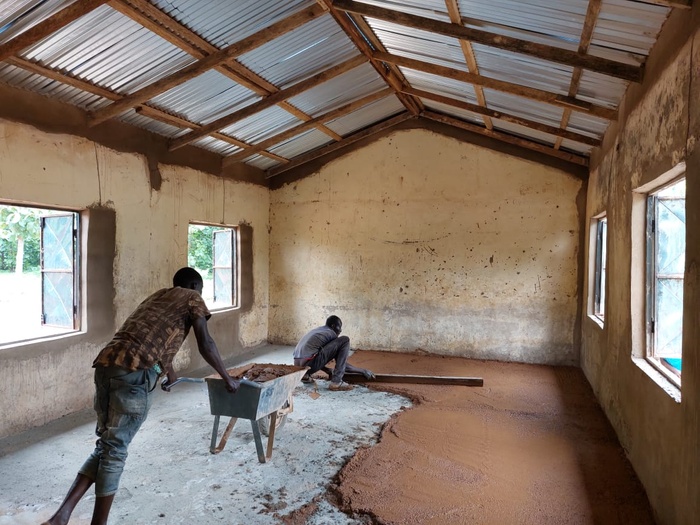
CHEERS!
Bashiru Elizabeth
Lead for HILARY'S KIDS
Ghana.

